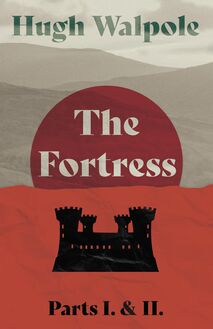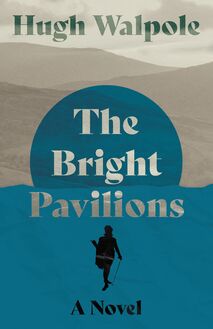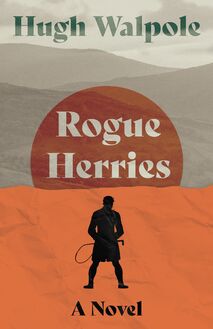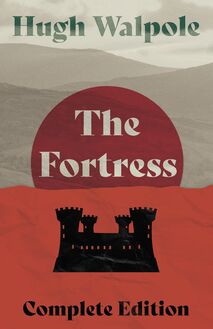-
 Univers
Univers
-
 Ebooks
Ebooks
-
 Livres audio
Livres audio
-
 Presse
Presse
-
 Podcasts
Podcasts
-
 BD
BD
-
 Documents
Documents
-
- Cours
- Révisions
- Ressources pédagogiques
- Sciences de l’éducation
- Manuels scolaires
- Langues
- Travaux de classe
- Annales de BEP
- Etudes supérieures
- Maternelle et primaire
- Fiches de lecture
- Orientation scolaire
- Méthodologie
- Corrigés de devoir
- Annales d’examens et concours
- Annales du bac
- Annales du brevet
- Rapports de stage
La lecture à portée de main
Vous pourrez modifier la taille du texte de cet ouvrage
Découvre YouScribe en t'inscrivant gratuitement
Je m'inscrisDécouvre YouScribe en t'inscrivant gratuitement
Je m'inscrisEn savoir plus
Vous pourrez modifier la taille du texte de cet ouvrage
En savoir plus

Description
Crime and romance take over the idyllic Lake District setting in this first volume in Hugh Walpole’s, The Herries Chronicle.
First published in 1930, Rogue Herries is narrated by the titular character as he describes Francis Herries’ story and his decision to move his family from their Yorkshire home to the beautiful Borrowdale valley in Cumbria. The tumultuous family drama follows Francis as he mistreats his wife, sells his mistress, and chases after a young teenage girl. His son, David, leads a life almost as eventful as his father’s, while his sister quietly dreams of things beyond her reach.
Read & Co. Books have proudly republished Rogue Herries, the ideal period drama for historical fiction lovers.
Sujets
Informations
| Publié par | Read Books Ltd. |
| Date de parution | 24 août 2022 |
| Nombre de lectures | 0 |
| EAN13 | 9781528797610 |
| Langue | English |
| Poids de l'ouvrage | 1 Mo |
Informations légales : prix de location à la page 0,0500€. Cette information est donnée uniquement à titre indicatif conformément à la législation en vigueur.
Extrait
ROGUE HERRIES
A NOVEL
By
HUGH WALPOLE
First published in 1930
Copyright © 2022 Read & Co. Classics
This edition is published by Read & Co. Classics, an imprint of Read & Co.
This book is copyright and may not be reproduced or copied in any way without the express permission of the publisher in writing.
British Library Cataloguing-in-Publication Data A catalogue record for this book is available from the British Library.
Read & Co. is part of Read Books Ltd. For more information visit www.readandcobooks.co.uk
FOR A TRUSTED FRIEND AND IN LOVE OF CUMBERLAND
Contents
Hugh Walpole
PART I
THE CUCKOO IS NOT ENCLOSED
THE I NN—THE HOUSE
THE MOUNTAIN
FAMILY
THE DEVIL
CHINESE FAIR
THE SEA—FA THER AND SON
CHR ISTMAS FEAST
DEATH OF MARG ARET HERRIES
PART II
’FORTY-FIVE
LAUGHTER OF A SPANIEL
I NTO THE CAVE
WITCH
THE ROCKING WOOD
SIEGE IN FOG
THE PRINCE
PART III
THE WILD MARRIAGE
CANDLELIGHT RE SPECTABILITY
THE W ILD MARRIAGE
THE VOICE
S AGA OF DAVID
I. THE YOUNG SARAH
S AGA OF DAVID
II. THE FIGHT A BOVE WASDALE
HER RIES IN 1760
THE LOVER
MIRABE LL IN FLIGHT
ULDALE
I. FOUNDING OF A FAMILY
PART IV
THE BRIGHT TURRETS OF ILION
RETURN O F A WANDERER
ULDALE
II. FAMILY LIFE
THEY MEE T IN PENRITH
FEB. 4, 1772
PHANTASMAGORIA IN THE HILLS
THEY ARE ALONE A ND ARE HAPPY
DEPARTURE FROM HERRIES
Hugh Walpole
Hugh Seymour Walpole was born in Auckland, New Zealand in 1884. He was educated at a series of boarding schools in England, followed by Emmanuel College, Cambridge. Walpole’s father hoped he would follow him into the clergy, but after three years as a missionary, in 1909, Walpole resolved to become a man of letters. His first commercial success came in 1911 with the novel Mr Perrin and Mr. Traill , after which Walpole made the acquaintance of writers such as Henry James and Joseph Conrad, and declared his ambition to become the greatest writer of his era. For the rest of his life, Walpole wrote prolifically. During the twenties he produced more than a novel a year, with The Cathedral (1922) and Wintersmoon (1928) proving to be great successes. In 1930, he began his most popular series of novels with the historical romance Rogue Herries , following it with Judith Paris (1931), The Fortress (1932) and Vanessa (1933). Eventually, he amassed an oeuvre of 36 novels, five volumes of short stories, two plays and three volumes of memoirs. He died in 1941, aged 57. Despite the fact that Walpole sold enormously well on both sides of the Atlantic, and was praised by many of his contemporaries, he is somewhat forgotten now, in part because he was overshadowed by P. G. Wodehouse and others.
Over this country, when the giant Eagle flings the shadow of his wing, the land is darkened. So compact is it that the wing covers all its extent in one pause of the flight. The sea breaks on the pale line of the shore; to the Eagle’s proud glance waves run in to the foot of the hills that are like rocks planted in green water.
From Whinlatter to Black Combe the clouds are never still. The Tarns like black unwinking eyes watch their chase, and the colours are laid out in patterns on the rocks and are continually changed. The Eagle can see the shadows rise from their knees at the base of Scawfell and Gable, he can see the black precipitous flanks of the Screes washed with rain and the dark purple hummocks of Borrowdale crags flash suddenl y with gold.
So small is the extent of this country that the sweep of the Eagle’s wing caresses all of it, but there is no ground in the world more mysterious, no land at once so bare in its nakedness and so rich in its luxury, so warm with sun and so cold in pitiless rain, so gentle and pastoral, so wild and lonely; with sea and lake and river there is always the sound of running water, and its strong people have their feet in the soil and are independent of all men.
During the flight of the Eagle two hundred years are but as a day—and the life of man, as against all odds he pushes toward immortality, is et ernal . . .
PART I
THE CUCKOO IS NOT ENCLOSED
THE INN—THE HOUSE
A little boy, David Scott Herries, lay in a huge canopied bed, half awake and half asleep.
He must be half awake because he knew where he was—he was in the bedroom of the inn with his sisters, Mary and Deborah; they were in the bed with him, half clothed like himself, fast sleeping. Mary’s plump naked arm lay against his cheek, and Deborah’s body was curled into the hollow of his back and her legs were all confused with his own. He liked that because he loved, nay, worshipped, his sis ter Deborah.
He knew also that he was awake because, lying looking up, he could see the canopy that ran round the top of the bed. It was a dull faded green with a gold thread in it. He could see the room too, very large, with rough mottled white walls and a big open stone fireplace; there was a roaring, leaping fire—the only light in the room—and he could see very clearly the big, shining brass fire-dogs with grinning mouths like dragons and stout curly tails.
He knew, too, that he was awake, because he could see Alice Press sitting there, her clothes gathered up to her knees, warming her legs. He did not like Alice Press, but she always fascinated him, and he wondered now of what she was thinking, so motionless, her head with its red hair pushed forward, her naked neck above her sil ver brocade.
He knew that he was awake, because he could hear the sounds of the inn, voices calling, doors banging in the wind, steps on the stair, and even the snap-snap of horses’ hoofs on the cobbles of the yard. He could hear the wind too, rushing up to the windows and shaking the panes and tearing away again, and then he shivered, pleasantly, luxuriously, because it was so warm and safe where he was and so cold and danger ous outside.
Then he shivered again because he remembered that he, with the others, must soon plunge out again into that same wind and mud and danger.
He would like to stay thus, in this warm bed, for ev er and ever.
But, although he was awake enough to know all these things, he must be asleep also—asleep because, for one thing, the room would not stay still, but leapt and rollicked with the fire. All the things in it moved; the fire-dogs grinned and yawned; over a large arm-chair of faded red silk, oddly enough, some harness had been slung, and it lay there in coils of silver and dark brown leather, and these coils turned and stretched and slipped like snakes. Then against the wall there was a long, thin mirror in tarnished silver and, in this, Alice Press was most oddly reflected, the side of her face that was shown there being very thin and red, her hair tawny-peaked like a witch’s hat; her eyebrow jumped up and down in a terrif ying manner.
Only David was not afraid. He was a very fearless boy. But he thought, as he lay there and watched, how ugly she was in the mirror, and that if his father saw her thus he would not chuck her beneath the chin and so make his mother unhappy. And, although he was not afraid, he was glad nevertheless that Mary’s warm arm was against his cheek and the round shape of Deborah’s body again st his back.
Because it might be that after all Alice Press was a witch. (He had always had his secret suspicions.) The way that she sat there now, so motionless, bending forward, was just as though she were making spells—and the silver harness blinked and the glass of the mirror trembled as the flame of the fire rose and fell again.
Then, again, it must be that he was still asleep because, although he knew that he was lying in his bed, he knew also that he was yet bumping and tossing in the coach. In that coach they had surely been for weeks and weeks, or so at least it had seemed to his tired and weary body.
At first when they had set out from Doncaster—how long ago?—he had been all pride and pleasure. It had been a fair and lovely morning—one of the last of the late summer days. The sun was shining, the birds singing, such gay bustle about the cobbled courtyard of the inn, the maids looking down from the windows, the hostlers busy about the horses, the postilions polite and eager to his father, all of them, Mother and Father Roche and Alice Press and Mary and Deborah fitting so comfortably into the soft warm inside of the coach, that had even pictures of hunting painted on the walls and little windows with gold roun d the edges.
Yes, it had been all gay enough then, but how miserable it had soon become! He could not now divide the days and nights from one another: moreover, he was still there in the coach, bumped up and down, thrown here and there, sleeping, waking with cramp and pins and needles, and Deborah crying and needing comforting, and Mary cross, and his mother frightened, and Alice Press sulky. Only Father Roche, reading in his purple book, or looking steadily in front of him, never perturbed nor upset nor unhappy, always grave and kind, and miles and miles away fr om them all!
Then the Great North Road, which had sounded so fine and grand when he had first heard of it, how different it was in reality! Not fine and grand at all, but full of deep ruts and mud so fearful that again and again the coach was hopelessly stuck in it, and everyone had to pull and push, cursing and swearing. Once they were almost upset. The coach went right over on its side and the horses went down, and they were all on the top one of another. He, David, had a bruise on his right leg, and his mother’s ch eek was cut.
The further they went the colder it became. They seemed, almost at once, to leave summer right behind them.
Nor were the inns where
-
 Univers
Univers
-
 Ebooks
Ebooks
-
 Livres audio
Livres audio
-
 Presse
Presse
-
 Podcasts
Podcasts
-
 BD
BD
-
 Documents
Documents
-
Jeunesse
-
Littérature
-
Ressources professionnelles
-
Santé et bien-être
-
Savoirs
-
Education
-
Loisirs et hobbies
-
Art, musique et cinéma
-
Actualité et débat de société
-
Jeunesse
-
Littérature
-
Ressources professionnelles
-
Santé et bien-être
-
Savoirs
-
Education
-
Loisirs et hobbies
-
Art, musique et cinéma
-
Actualité et débat de société
-
Actualités
-
Lifestyle
-
Presse jeunesse
-
Presse professionnelle
-
Pratique
-
Presse sportive
-
Presse internationale
-
Culture & Médias
-
Action et Aventures
-
Science-fiction et Fantasy
-
Société
-
Jeunesse
-
Littérature
-
Ressources professionnelles
-
Santé et bien-être
-
Savoirs
-
Education
-
Loisirs et hobbies
-
Art, musique et cinéma
-
Actualité et débat de société
- Cours
- Révisions
- Ressources pédagogiques
- Sciences de l’éducation
- Manuels scolaires
- Langues
- Travaux de classe
- Annales de BEP
- Etudes supérieures
- Maternelle et primaire
- Fiches de lecture
- Orientation scolaire
- Méthodologie
- Corrigés de devoir
- Annales d’examens et concours
- Annales du bac
- Annales du brevet
- Rapports de stage














